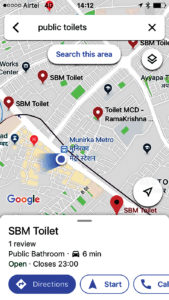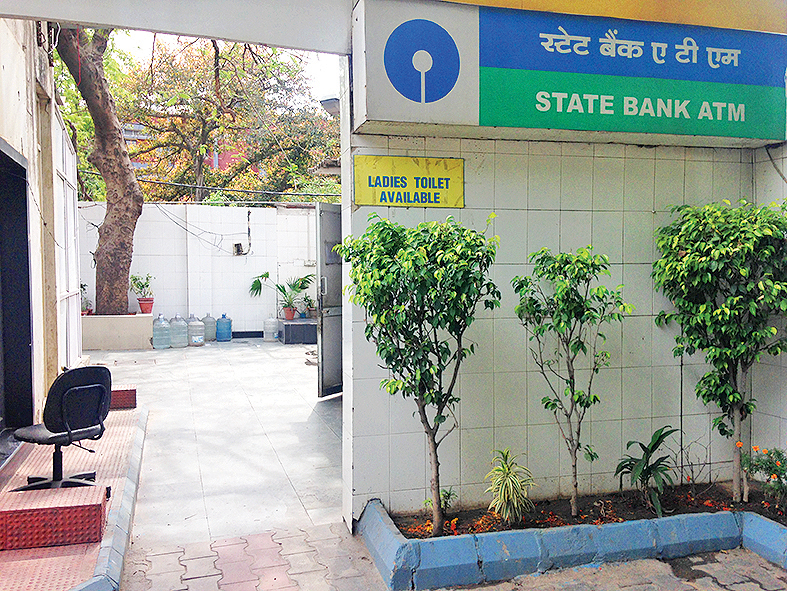When you gotta go, is it easy to find a public loo nearby? You can use Google Maps or ask around, but in the end the facilities may not be up to the mark
If a CapitAL city should be a model for the rest of the country, one of the basics it has to get right is easy access to public toilets. Can citizens and tourists find one when nature calls?
Delhi, as we found out, has many public toilets scattered around but finding them is still an exercise in asking around and depending on directions given by people. This is despite the fact that Google, in partnership with the central government, produced a feature which would help locate public toilets on the map two years back, in 2017. Many people we spoke to do not know of such a feature.
Our own search for toilets was spread out over south Delhi, where we sought to assess availability and attitudes. Starting out at Munirka, its Pratap Market had no toilet facilities. One of the men working at a snack shop said that he relieves himself in the open. The nearest Swachh Bharat Mission toilet is located at a petrol pump which is a 6-minute walk away. He obviously thought it was too long a walk to take each time he wants to take a leak. Women working in that market or visiting have a tough time.
At the petrol pump, the facilities are in a comparatively clean state. The guard says women use it at all times. Here the toilets remain open through the night, unlike most others which close by 10 pm. Also, a guard is posted there.
A little further away, we found a toilet at DDA district park which lived up to the image most of us expect of public toilets: dirty and dingy. An older man who introduced himself as Kallu Ram said he cleaned the toilets every day, getting a salary of Rs 7,000 per month. In his own home at a slum, he has improvised, digging a hole for his wife, as “she is unwell and cannot walk all the way to the community toilet,” he says.
About a kilometre from the park is a pink toilet in Vasant Vihar. Part of the initiative by National Commission for Protection of Child Rights in partnership with SDMC and PVR Nest, its first toilet was opened in Vikaspuri. The concept here is to provide women-only facilities, and have provisions such as vending machines for sanitary napkins and a breast-feeding area.

The vending machines provide one sanitary napkin for Rs 5. In the one opposite the once popular PVR Priya area, the lady caretaker says that despite requisitioning more pads five days ago, they have not arrived. There’s just one left in the machine and no handwash soap.
In fact, most toilets in the city show the same disregard for washing hands with soap and only provide water. Also, like most others, this facility closes by 10 pm, after which those who want to relieve themselves usually take advantage of the cover of darkness.
While at each location in South Delhi we found toilets a couple of kilometres away at the most, the sight of men peeing by the roads still has to be endured. Who would have thought that despite having several toilets provided in the city, its men would prefer to still go out in the open? We cannot blame the fact that Google Maps’ provision is something many individuals do not know of. But it would especially be a helpful tool for women, as it’s not acceptable for them to go out in the open as it is for men.
A report of the Comptroller and Auditor General of India in 2018 shows that still, there aren’t enough toilets being built to accommodate the actual need.
According to them the South DMC, DCB and DUSIB did not project construction of public toilets at all whereas North DMC, and East DMC found the necessity of constructing only 205 and 120 public toilets against 4,116 and 1,972 respectively projected by the central government.
The auditor also noticed that South DMC did not project any requirement for construction of community toilets and public toilets under the Mission, citing space constraints. The government of Delhi, however assessed requirements of 605 public toilets to be constructed under the Mission scheme up to October 2019. Not a single toilet, however, was constructed under the Mission by any of the six implementing agencies in the given period since inception of the scheme on October 2, 2014 until March 31, 2017.
In a reply to a question in the Lok Sabha on February 5, 2019, on ‘construction of toilets’, the Minister of State (independent charge) of Ministry of Housing and Urban Affairs Hardeep Singh Puri had provided details of the funds allocated, released and utilised for information, education, communication and public awareness under Swachh Bharat Mission (SMB). For Delhi, the figures showed that while the total allocated fund was Rs 24.61 crore, Rs 11.20 crore was actually released, out of which a utilisation certificate was received for just Rs 3.05 crore.
A report of SBM showed that up to February 10 of this year, the total allocation in Delhi for the construction of community and public toilets stood at Rs 5.15 crore. It also said that none were accounted for from 2016 to January 31, 2019.
For women, the state of public toilets is still not up to the mark. In 2017 December, a study involving 229 toilets by NGO Action Aid had found that only 149 had facilities for women. The women’s facilities were in fact being used by men, in the absence of any upkeep. Several had missing doors and locks. According to the report, out of 229 toilets, 70% were not clean, 65% had no flush facility, 50% had no water supply, 70% had no signages and almost 70% were not disabled friendly.
Another study would be needed to find out the availability of public toilets for the entire city. In this respect, South Delhi does not present a pretty picture.





